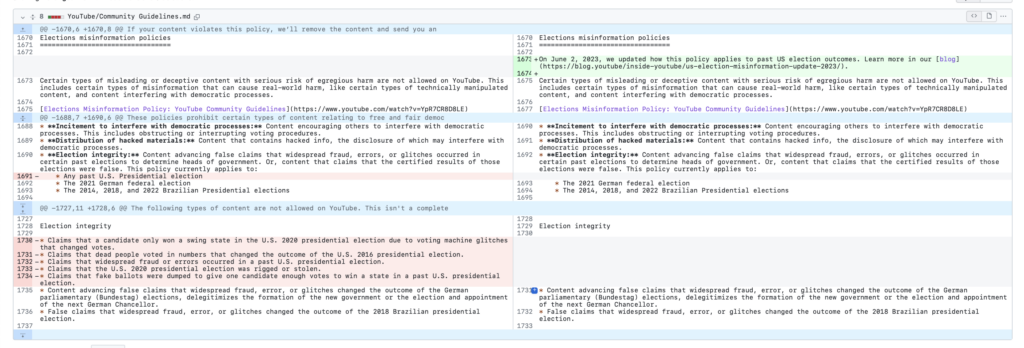YouTube ‧ Community Guidelines · June 2, 2023
YouTube changed its guidelines now allowing false claims regarding the 2020 and other past US presidential elections on their site. An updated YouTube elections misinformation policy implies that the platform will no longer remove false information about any past US presidential election, including claims about widespread fraud, errors, or glitches as well as fake ballots. (See the change in our archive).

With this change, YouTube says, the platform tries to avoid “the unintended effect of curtailing political speech without meaningfully reducing the risk of violence or other real-world harm”. While the platform claims the policy change should provide the “ability to openly debate political ideas”, right-wing media are already celebrating this news and praising Twitter’s owner Elon Musk for influencing YouTube’s decision.
In fact, YouTube’s policy update followed other major social media platforms abandoning the ‘2020 lies’, as noted by technology journalist Casey Newton. Earlier this year, Meta restored Facebook and Instagram accounts of Donald Trump, the main propagator of the ‘stolen election’ claim. Twitter has taken no action on the 2020 election misinformation since March 2021.
Despite the platforms’ appeals for freedom of political expression, downgrading misinformation policy cannot help but raise concerns about its impact on the integrity of the upcoming 2024 election and other democratic processes in the future. YouTube promised to share more details on its approach towards the 2024 election in the next months. Same is expected from other social media platforms, as the 2024 campaigns are already gaining momentum.
The Platform Governance Archive (PGA) is hosted by the Lab Platform, Governance, Media and Technology at the University of Bremen. It keeps track of the key policy documents of all the major platforms to make this knowledge more accessible for everyone. In the following weeks and months, we will re-launch the PGA’s website, allowing bulk data downloads of platform policies and publishing regular briefings on changes in platform policies.